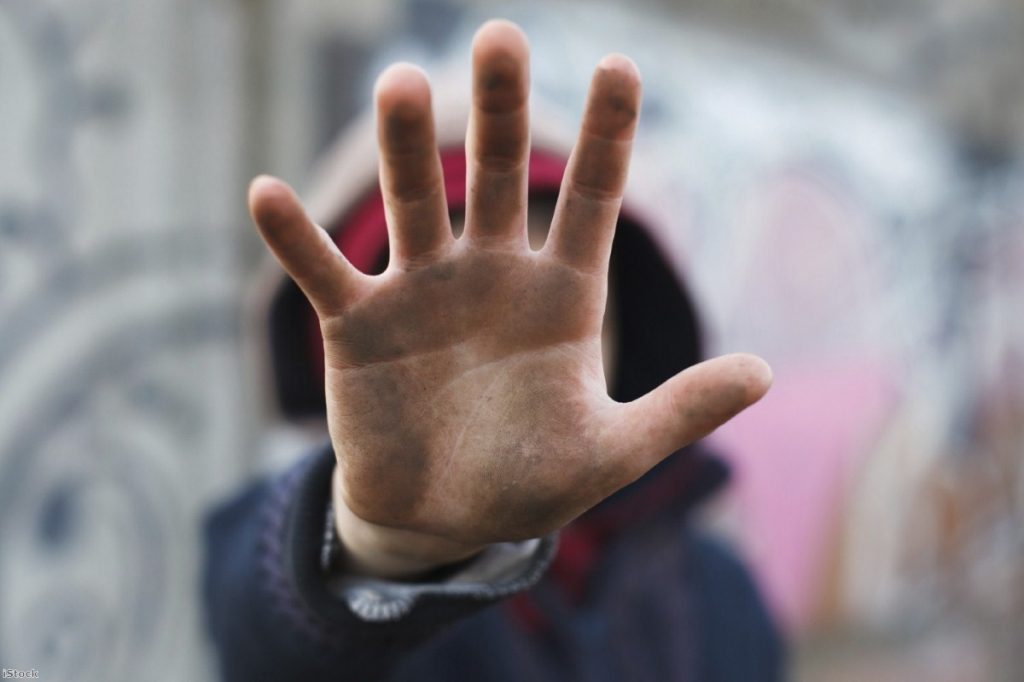Asylum seekers in the Calais Jungle are regularly facing violence and even sexual abuse from French police and roving far-right gangs, new research suggests.
An extensive new survey of camp residents, conducted by the Refugee Rights Data Project, found ldrenldren are also being targeted.
Fifty-four per cent of people in the camp said they never felt safe there, while a further 22% said they did not feel "very safe". The figure was higher for children, with 61% saying they never felt safe.
One of the most significant threats to their security came from French police, respondents said, with many stressing they were "very violent" towards the Jungle's inhabitants.


"The French police treat us the same as Syrian police," one resident said.
Seventy-five per cent of respondents said they'd experienced police violence, including consistent reports of severe beatings and pepper spray.
73% #refugees have experienced violence from police in #CalaisJungle. Report by @RefugeeData https://t.co/pxX5RPcra4 pic.twitter.com/RRFJ0zl55W
— HelpRefugeesUK (@HelpRefugeesUK) March 12, 2016
Asylum seekers also cited racism and violence from local residents around Calais.
"They yell, spit and insult from cars," one respondent said.
Another added: "They hold their noses as refugees go past, as if they smell."
Nearly half the people interviewed for the survey (49.2%) said they suffered some sort of discrimination from French citizens during their time at the camp.
This was most likely to be a verbal insult or racist remark, which appeared to be particularly common while walking between the camp and the town centre. Glasses and rubbish were often thrown from cars as they passed
Many shops in the centre refuse to serve refugees and masked men have been reported targeting refugees and beating them with sticks when they enter the town. Guns, knives and aggressive dogs are also used.
The local Lidl supermarket appeared to be a key point for violence with respondents saying they were often attacked by what seemed to be coordinated groups consisting of up to 20 men. Many of those surveyed showed researchers broken bones and head injuries from the attacks.
Some suspected that the groups of men were non-uniformed police. They claimed perpetrators wore items from their uniforms and carried guns or other weapons they had seen being used by authorities.
Some 2.8% of respondents said they had experienced sexual violence in these encounters, although none would give further details.
We're just putting the finishing touches to our #Calais report – ready to launch at 6pm tomorrow! #refugeedata pic.twitter.com/8Q5RM6J9tn
— Refugee Rights Data (@RefugeeData) April 3, 2016
Roughly 14% of the people interviewed in the camps were children, the majority of whom were living unaccompanied by an adult. Just 6.7% of the children reported being with a parent.
Children also feared police violence or attacks by fascist groups in the town or on the periphery of the camp. They were also scared of violence in the camp from other residents, branding it a "free for all" with "no laws or protection".
One 17-year-old Afghan said: "As I am young I feel scared and don't know who to turn to."
A 16-year-old said: "In Afghanistan there's 80% to die, here there's 100% chance."
The survey follows a Help Refugees UK census which found 129 unaccompanied minors from the Jungle have gone unaccounted for since authorities demolished the southern section of the camp last month.
"This is simply not acceptable," it wrote in a post on Facebook.
"We call on the French authorities to put systems in place immediately to register and safeguard the remaining 294 lone children in the camp.
"No alternative accommodation was provided for unaccompanied minors during the evictions, no assessment was made by the French authorities of their needs and no systems put in place to monitor them or provide safeguarding. There is no official registration system for children in place In Calais or Dunkirk."
According to the EU police agency Europol, more than 10,000 unaccompanied child refugees have disappeared in Europe in the last two years. Experts fear the children may be being sold into sexual slavery.












